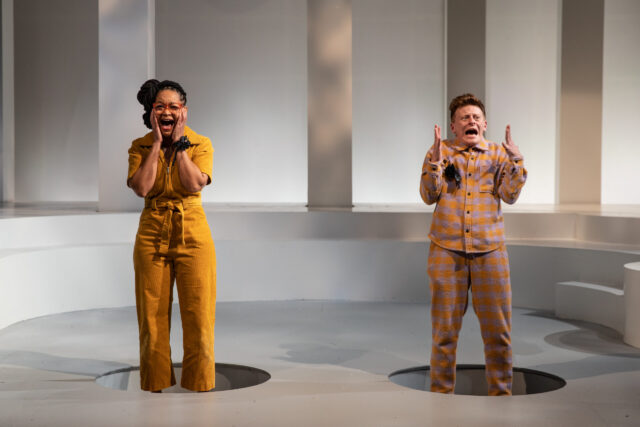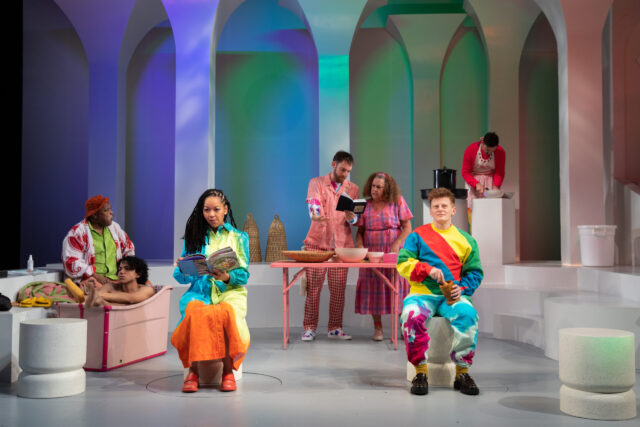
Sheila (Crystal Dickinson) and David (Jess Barbagallo) are stuck in a rut in The Trees (photo by Chelcie Parry)
THE TREES
Playwrights Horizons, Mainstage Theater
416 West 42nd St. between Ninth & Tenth Aves.
Tuesday – Sunday through March 19, $46-$76
www.playwrightshorizons.org
In L. Frank Baum’s 1919 book The Magic of Oz, the thirteenth and next-to-last of the illustrated Oz novels, a little girl named Trot and grizzled former sailor Cap’n Bill suddenly get stuck in the ground, and their feet start growing roots. As Baum writes: “This is hard luck,” [Cap’n Bill] declared, in a voice that showed he was uneasy at the discovery. “We’re pris’ners, Trot, on this funny island, an’ I’d like to know how we’re ever goin’ to get loose, so’s we can get home again.”
That’s precisely what happens to Sheila (Crystal Dickinson) and her older brother, David (Jess Barbagallo), near the beginning of Agnes Borinsky’s The Trees, making its world premiere at Playwrights Horizons (coproduced by Page 73) through March 19. It’s also what happens to the play itself, which is stuck in the mud from the get-go.
Sheila and David are both drunk, returning from a party. Instead of going into their house, they gleefully run around the forest until their feet get trapped in large circles and their toes start growing roots. “There’s still so much to do,” David says. “Will anyone notice?” Sheila asks.
People will notice, but there appears to be nothing much they can do about it as life goes on around the siblings, including visits from their Polish grandmother (Danusia Trevino); their longtime friend Charlotte (Becky Yamamoto); David’s boyfriend, Jared (Sean Donovan); Norman (Ray Anthony Thomas), who is caught in some nearby bushes; Saul (Max Gordon Moore), a rabbi from Cleveland; Sheryl (Marcia DeBonis), from the Cleveland congregation Sisterhood; twinks Julian (Nile Harris) and Tavish (Pauli Pontrelli); street vendor Terry (Sam Breslin Wright), who immediately senses opportunity; and, later, a child named Ezra (Xander Fenyes).

Agnes Borinsky’s The Trees takes place in a candy-colored forest (photo by Chelcie Parry)
Among the topics of conversation are capitalism, religion, romance, and loneliness, with hints at environmentalism.
“I think there’s a certain threshold of love one needs to feel in one’s life,” Norman says. “And if you never meet that threshold you continue to be filled with longing. You can keep on — but you’re hungry. And that is me. Slightly hungry. To the bitter end.”
The rabbi admits, “I’ve felt a great sliding in the world. Like we’re all sliding off this planet into somewhere . . . dark and ugly and dead. It seems a little bit like it’s all on autopilot. Like God is off . . . somewhere . . . else. And the plane of the world is off, somehow, and we’re just sliding. . . . And so when I read about you two, it seemed to me like God might have returned. And that this was the hand of God, that rooted you here. That life isn’t the miracle, but staying put. Because if the world were to tilt and the rest of us were to slide, you’d still be right here.”
David and Sheila remain right there as life plods forward, evoking Didi and Gogo in Beckett’s Waiting for Godot and Franz Kafka’s The Metamorphosis, but Borinsky (A Song of Songs, Ding Dong It’s the Ocean) is never able to establish much of a story aside from the central idea of two characters in search of an exit. In a “Playwright’s Perspective” program note, she admits, “I’m not great at writing plot. I end up writing logistics. . . . Plots are a bit ridiculous.” Unfortunately, a plot is precisely what The Trees needs, something to be nurtured, that can grow over the course of, in this case, a striking-looking but ultimately aimless 105 minutes. (The fun lighting is by Thomas Dunn, with sound by Tei Blow and puppets by Amanda Villalobos.)
Parker Lutz’s pristine white set is a glistening fairy-tale world with Greek columns, but the narrative is choppy and random. Enver Chakartash’s costumes can get wildly colorful, at times conjuring the rainbow Pride flag, but it’s primarily all for show, with not enough substance. Too often characters come and go without adding much, anecdotes that might be cute but are not critical. Director Tina Satter (Is This a Room, Ghost Rings) can only do so much with her two stars essentially cemented in place, and I’m still trying to figure out why David and Sheila occasionally go down into the ground and then come back up again; it’s a cool effect that does not have any apparent reason, fitting in with the rest of the play.
In Baum’s The Magic of Oz, the Kalidah reflects, “Our own Kalidah King has certain magical powers of his own. Perhaps he knows how to fill up these two holes in my body.” Perhaps he also knows how to fill up the two bodies in holes in The Trees.